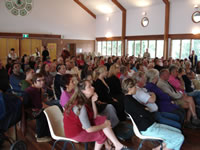Mullumbimby Action Group -> community -> meeting050408
Mullumbimby Action Campaign against Woolworths hears of hidden Agenda
On the 5th April 2008 a crowd of 200 people filled the St John's
Hall in Mullumbimby to hear the latest news on the campaign against
Woolworths.
Speakers included Ray Darney, Rose Wanchap, John Dolman, Helena Norberg
Hodge and Kali Wendorf. Rose Wanchap warned that the proposed Woolworths
Development heralds a hidden agenda of bigger development for Mullumbimby.
.jpg) Rose continued, "Many people have been attracted to Mullumbimby because they love the uniqueness of the Village. There has been a big exodus from Byron because people don't like the Multinationals coming in. So it is important for you as a group to stay focused on strengthening the Mullumbimby community. Large shopping centres can attract the elderly who like to be close, which is not all bad news for those who have houses close by, however businesses will struggle for sure, because ultimately people will go where the prices take them. They will initially think they can get a better price at Woolies. I run a business which has been competing against the big franchises such as Hookers and First National for six years now. I have survived because I have offered a special heart to heart business. A lot of people here would realise that if you can hold a unique place for your business against Woolworths.you will be rewarded.
Rose continued, "Many people have been attracted to Mullumbimby because they love the uniqueness of the Village. There has been a big exodus from Byron because people don't like the Multinationals coming in. So it is important for you as a group to stay focused on strengthening the Mullumbimby community. Large shopping centres can attract the elderly who like to be close, which is not all bad news for those who have houses close by, however businesses will struggle for sure, because ultimately people will go where the prices take them. They will initially think they can get a better price at Woolies. I run a business which has been competing against the big franchises such as Hookers and First National for six years now. I have survived because I have offered a special heart to heart business. A lot of people here would realise that if you can hold a unique place for your business against Woolworths.you will be rewarded.
Planning Approval Process
 Ray Darney from Byron Shire Council answered questions about the approval and planning process for the Woolworths DA. He said that changing the ownership of the land does not affect any approval already given. The approval goes with the land, not the owner. This quite a common process, an owner gains development approval then resells the land with the approval.
Ray Darney from Byron Shire Council answered questions about the approval and planning process for the Woolworths DA. He said that changing the ownership of the land does not affect any approval already given. The approval goes with the land, not the owner. This quite a common process, an owner gains development approval then resells the land with the approval.Q: Will there be an opportunity for community input or any objections?
A: "My intent is (and I have told Woolworths this) to have some kind of public submission meeting and put up the plans in the council chambers and tell the community what is going on."
Q: Will Byron Shire ratepayers be subsidising any infrastructure for this development?
A: "The minister has allowed a discount of $625,000 dollars in section 94 contributions in order to pay for the roundabout. Council was going to construct a roundabout there (Station and Burringbar Sts.) when council had sufficient funds. In this arrangement, the minister has said the roundabout must be built and so has council. The minister has allowed funds of $625,000 to go towards the roundabout. As well as that, they have to pay council another 570,000 dollars for section 94. As council sees it it is a cost neutral situation because we would have had to build the roundabout anyway. It should be cost neutral as long as they can build their roundabout for $620,00 dollars."
Comment: It looks like we are going to subsidise the roundabout (Ed).
The Fragmentation of Town Centres
 John Dolman said, "I am against the site in Station St. because it will fragment that very good feeling we have within our town centre. I have been in many towns where the town centre has been fragmented, such as Coff's Harbour, where it has taken nearly fourty years for the old main street to stop being a crime zone. I believe our position (Santos ) is to encourage the local community. When I suddenly get a multinational like Woolworths coming to town, I feel that all the effort that we have put into the main street of Mullumbimby , in creating community, can get wiped out, just like that."
John Dolman said, "I am against the site in Station St. because it will fragment that very good feeling we have within our town centre. I have been in many towns where the town centre has been fragmented, such as Coff's Harbour, where it has taken nearly fourty years for the old main street to stop being a crime zone. I believe our position (Santos ) is to encourage the local community. When I suddenly get a multinational like Woolworths coming to town, I feel that all the effort that we have put into the main street of Mullumbimby , in creating community, can get wiped out, just like that."The Multiplier Effect
"I am very passionate about towns of old, where local businesses congregated to serve the people. A lot of businesses think they are there to serve and to create community, and it is only through the community that we can create a common wealth. A hundred years ago the dollars were always spent within the town. One dollar used to circulate 20 to 30 times within the town (the multiplier effect). Probably 50 years ago with the advent of corporations and transport systems, that all started to degenerate. Even 50 years ago, towns like Mullumbimby were basically self sufficient. I passionately believe that with the coming of peak oil and global warming , we need to become resilient self sufficient communities. And right at the time when we need to strengthen our local community, we are being attacked by this monolithic business."Children Thrive on Connectedness
 Kali Wendorf said, "Children really thrive on connection and they don't thrive on disconnection. In the beginning, it is mum, dad, and the family, but as the child grows older it starts to connect to the neighbourhood, and the community. Children define themselves by the world around them. As the world becomes increasingly corporatised, everything becomes more anonymous. Children have less to define themselves against. and it becomes more synthetic. Children need connection, and so connections with the local business people and local towns-people, become very important. These connections can be subtle and normal, but they actually play a very important place in how a child defines him or her self.
Kali Wendorf said, "Children really thrive on connection and they don't thrive on disconnection. In the beginning, it is mum, dad, and the family, but as the child grows older it starts to connect to the neighbourhood, and the community. Children define themselves by the world around them. As the world becomes increasingly corporatised, everything becomes more anonymous. Children have less to define themselves against. and it becomes more synthetic. Children need connection, and so connections with the local business people and local towns-people, become very important. These connections can be subtle and normal, but they actually play a very important place in how a child defines him or her self. "My two children live in a small town and they know the name of Trevor the butcher, and Denise and Barry who own the shoe store, and Gerard who owns the menswear shop and John who owns the healthfood store. These people know my children by name. They ask my children questions like "How are you today Sahaja?" "How did you do in your soccer game?" "What do you think of your new school , your teacher?"
"In small but important ways it is another set of eyes looking upon my children telling them that they count, that they are part of something bigger. That they are an important part of something bigger. So when you get a large corporate entity like Woolworths coming to a small village, what slowly erodes is that sense of connection for children. What we see when that connection diminishes, are symptoms of disconnection. These days we see these effects everywhere, with children binge drinking, depression, suicide, early drop-out from high school, attentional disorder, oppositional defiancy disorder etc. All these sorts of syndromes which have been labelled now in kids are symptoms of children living in a society which is very disconnected from itself.
| June 2025 | ||||||
|---|---|---|---|---|---|---|
| S | M | T | W | T | F | S |
| 1 | 2 | 3 | 4 | 5 | 6 | 7 |
| 8 | 9 | 10 | 11 | 12 | 13 | 14 |
| 15 | 16 | 17 | 18 | 19 | 20 | 21 |
| 22 | 23 | 24 | 25 | 26 | 27 | 28 |
| 29 | 30 | |||||
No events for today
Add your event here


